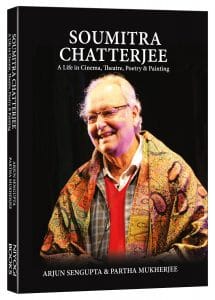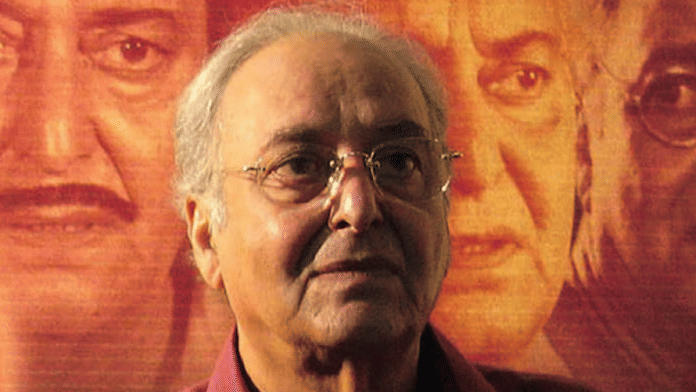Soumitra Chatterjee had a happy childhood in Krishnanagar, but there were unexpected anxieties. He remembers how his relatives did not think much about the way he looked. There are pictures of him that are less than flattering. He grew up thinking that he was not particularly good-looking. This made him self- conscious which he tried to cover up with a lively boisterousness. It hid a sensitivity that made it difficult for him to express his true self to the world.
His family was involved with the local theatre scene and he started acting in the natural course of things. It would become a proper vocation much later in Calcutta under the tutelage of Sisir Kumar Bhaduri. Yet even in his boyhood forays he won praise and a fair bit of local renown. This became a very liberating experience for him, allowing him to mask his insecurities by freely becoming someone else. This preference for a mask or person as a mediator between his intensely shy self and the public at large has continued for the rest of his life. Even decades later, he still does not believe in autobiographies. He doubts whether anyone would want to know anything about his life, or even whether it is possible to really encapsulate a person in his complicated totality in a book. Above all, he wonders whether it would matter. He would rather be known by his work. Yet the unusual trajectory of his career and his choices as an artist have perhaps revealed more about the kind of person he is than a full-length expository tract on his personal life could ever have.
It is not as if he wants his life to be shrouded in mystery. If you ask anyone who has interviewed him over the years, they will tell you that he can be quite forthcoming. His passionate nature can quite often be fiery. He has no qualms about telling you about the time he punched Ritwik Ghatak in the face. Apparently, it was during the turbulent years in the late 1970s when the industry was going through a crisis, and there was a meeting called between all the stakeholders to resolve the issue. Soumitra says Ritwik who had a foul mouth was keeping up a steady stream of insults directed at Satyajit Ray who was not present. Soumitra understood that he was trying to rile him up. It was definitely annoying but he did not respond because he did not think someone like Ray needed anyone to defend him. Eventually Ritwik, failing to draw blood with his taunts at Ray, directed a few snarky comments at Soumitra who refused to take it lying down. He caught him by the collar, felled him with a punch and told him off in no uncertain terms – ‘You’re not dealing with a mild-mannered bhadrolok here,’ he remembers saying.
Also read: Soumitra Chatterjee, the Bengali legend you probably haven’t heard of but should
However, this has never stopped him from freely acknowledging Ritwik’s massive talent. He regrets never having had the opportunity to work with him. He had come very close, and was even supposed to meet him, but Ritwik turned up very late and drunk. Soumitra did not like that. He had been schooled in the hard school of professionalism by Ray, and he was not likely to make any exceptions for anybody.
Yet when it came to his mentors, Sisir Kumar and Ray, he was always the attentive and humble student. In fact, it is his dedicated loyalty to his mentors that is perhaps the most representative feature of his character. He is the quintessential company man, if by company one means the people he looked up to for intellectual and artistic guidance. He has written at length about the various technical accomplishments of Sisir Kumar as an actor and his massive contribution to Bengali theatre. He tirelessly defends him against what he thinks is ignorant or misplaced criticism. He met Sisir Kumar when the legend was at the end of his career. There was a significant difference between their ages. There was not enough time for them to forge a long and intimate relationship. Sisir Kumar remained a distant god he adored and from whom he learnt the foundations of his craft.
Also read: Apu, Feluda, Amal — 6 performances that made Soumitra Chatterjee one of India’s finest actors
He is perhaps too close to the works of Ray (having acted in most of his films) to write about him in the same manner but in his The Master and I, he has written fondly about his time spent with the master. The fact that Ray acted the role of a surrogate parent in his life is probably a pretty easy deduction to make. Ray chose him, moulded him, and set him off upon his career. He was a paternal figure responsible for the beginning of his new life as a film actor. Furthermore, he kept a watchful eye on him all his life. Soumitra ascribes everything he knows about films to him. Even when he resumed theatre in earnest, Ray was there with his honest and helpful critiques. And like a true father figure, he would take him to task as well.
Once when they were shooting Devi, Ray in an irritable mood discovered that Soumitra had not brought his dialogue sheets from the hotel. The location was more than a mile from the hotel, and Soumitra had already gone through costume and make-up. Ray peremptorily told him to go and get it. Humiliation comes easy to a young man, and Soumitra felt both hurt and angry. It was a knock on the head and as he later realised, a manifestation of Ray’s fondness for him too. Ray’s influence over the actor went beyond films, and he eventually became his guide in all matters of life, big and small. He was his family in a way no one in the industry has ever been.
 This excerpt from ‘Soumitra Chatterjee: A Life In Cinema, Theatre, Poetry & Painting’ by Arjun Sengupta and Partha Mukherjee has been published with permission from Niyogi Books.
This excerpt from ‘Soumitra Chatterjee: A Life In Cinema, Theatre, Poetry & Painting’ by Arjun Sengupta and Partha Mukherjee has been published with permission from Niyogi Books.







It’s ridiculous.
And you are completely delusional with your analysis ms papia
Soumitra was proud to say he was not a gentleman because he was a committed leftist. He also took out the money from Cinema workers emergency fund when he was treasurer to give to left trade union .